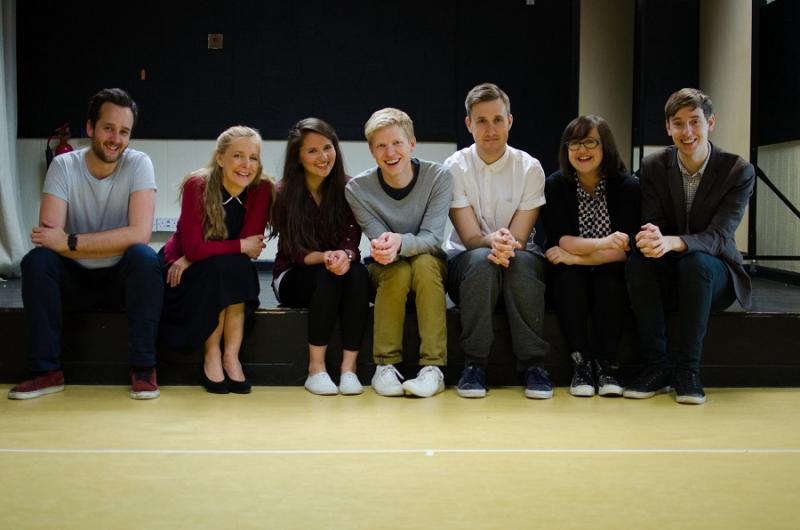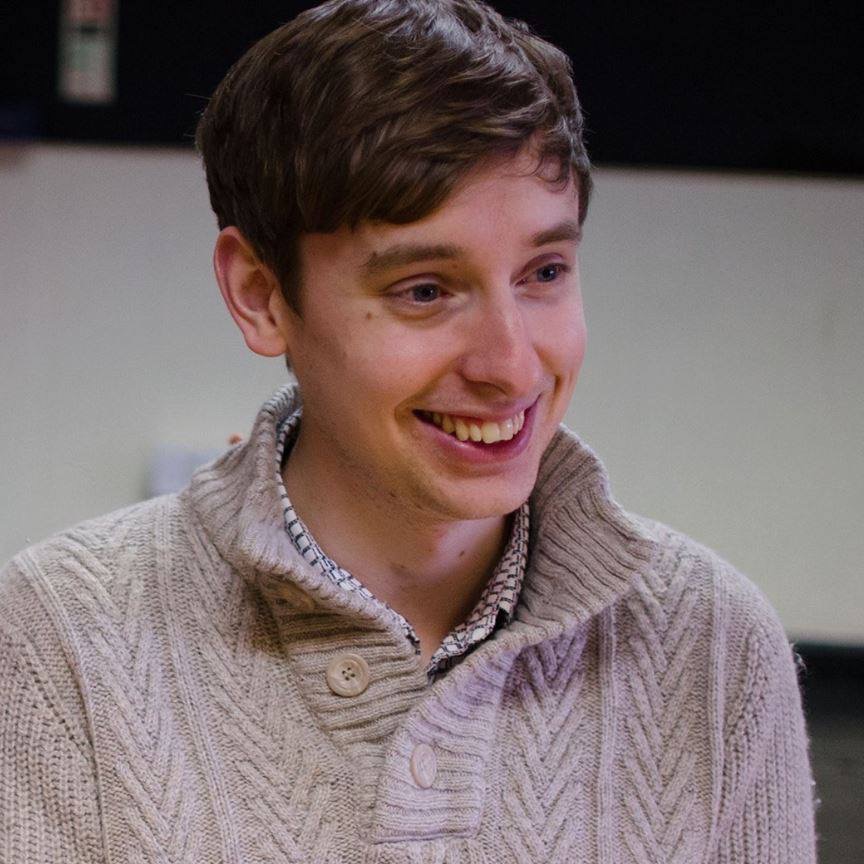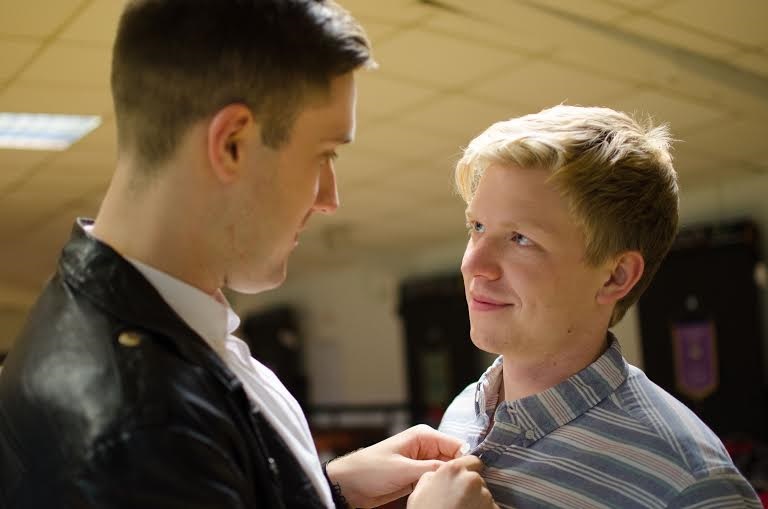Positive: Introducing a comedy about HIV/AIDS | reviews, news & interviews
Positive: Introducing a comedy about HIV/AIDS
Positive: Introducing a comedy about HIV/AIDS
Playwright Shaun Kitchener and director Harry Burton discuss their new production at the Park Theatre

Of all the art forms, theatre has been most attentive to the story of HIV/AIDS. Leading the way in America there was Larry Kramer’s The Normal Heart (1985) and Tony Kushner’s Angels in America (1991). In the UK the most resonant exploration of the virus’s devastating impact was Kevin Elyot’s My Night with Reg (1994).
Positive, which was first performed in Edinburgh in 2013, is being billed by the Park Theatre as “a refreshingly honest and ultimately uplifting comedy breaking down the out-dated preconceptions surrounding HIV and the 100,000+ people living with it in the UK today”. It tells of Benji, a young man a year into his diagnosis and eager to give his self-confidence a boost. To introduce the play, Kitchener and director Harry Burton explore its themes in conversation, exclusively for theartsdesk.
HARRY BURTON: Well Shaun, we’re a week and a bit away from sharing Positive with an audience in the round at Park 90. The timing is rather remarkable, with the USA’s acceptance of gay marriage and Pride happening in the build-up. So it’s probably a good time to ask what was the impulse to start writing this play?
 SHAUN KITCHENER (pictured right by Kim Williams): I was on a train reading a magazine article by an HIV-positive guy in his twenties talking about living his life with the virus. Most current HIV/AIDS plays are based on a version of life a couple of decades ago when things were a bit grimmer. He was blogging about going on a first date and not knowing when to disclose his HIV status. It turned out the guy he was dating already knew, thanks to gossip. So he was questioning the whole wisdom of disclosure – when to tell, whether to tell, whom to tell. It wasn’t so much about the health drama as it was about his regular life. I just thought that was an unfamiliar, unexplored angle. He was very helpful when I started writing, answering lots of my basic, technical questions. So he was the main inspiration.
SHAUN KITCHENER (pictured right by Kim Williams): I was on a train reading a magazine article by an HIV-positive guy in his twenties talking about living his life with the virus. Most current HIV/AIDS plays are based on a version of life a couple of decades ago when things were a bit grimmer. He was blogging about going on a first date and not knowing when to disclose his HIV status. It turned out the guy he was dating already knew, thanks to gossip. So he was questioning the whole wisdom of disclosure – when to tell, whether to tell, whom to tell. It wasn’t so much about the health drama as it was about his regular life. I just thought that was an unfamiliar, unexplored angle. He was very helpful when I started writing, answering lots of my basic, technical questions. So he was the main inspiration.
Did he come and see the show?
Yes, he’s been very nice about it. He said he wished his relationship with his doctor was as nice and friendly as the one in the play! Actually since then he has set up an online mag for HIV people, and happily he reviewed the play very favourably.
That was handy…
Yes, he especially liked the fact that it’s an HIV/AIDS play in which nobody was in any real risk of dying. That’s quite rare really.
Rare too that it’s a funny play about HIV/AIDS, I’d have thought. Did the fact that it’s a comedy happen unconsciously, or were you planning all along to make people laugh at humans in adversity?
Well, it happened quite naturally. If you’re breaking down stigma and taboo, in my own opinion humour is really the only way to go about it. Not to make light of the trouble, but to deploy humour while facing it. When times are hard, humour is a weapon that people count on. It helps with perspective, and counteracts the tendency to wallow in self-pity.
Samuel Beckett says there’s nothing funnier than unhappiness.
Absolutely.
Their sexuality isn’t a plot point, they’re just gay
Mind you, he also says, “Often now my murmur falters and dies and I weep for happiness as I go along...” Even though it’s a comedy, the play has a bittersweet balance between the ebb and flow of human insecurity, happiness and unhappiness. Was that something you wanted to highlight in the script as it developed over the period since Edinburgh 2013?
It’s certainly changed a lot. Not so much the characters and their stories. They’ve been tweaked. But the structure has changed a lot in the use of flashbacks, the exposition was very on the nose in the early days. The relationship between the straight couple has probably changed the most; it has developed from being a small subplot to reflect better the obstacles couples face when one person is HIV positive and the other isn’t.
We’ve added some stuff in rehearsal behind your back, and then you’ve come in and argued bits back in, added a few new jokes and so forth – there’s a sense that the play might still be growing. But then as director I probably have to be able to say "I think we're done," otherwise the actors get a bit frustrated by tiny cuts and additions. Definition is important with comedy. When is a play finished for you?
I’ll let you know! Maybe when you feel like it’s ready to be seen? (Pictured below: Ryan J Brown and, as Benji, Tim George)
 But you’re very collaborative. Not all writers can manage that.
But you’re very collaborative. Not all writers can manage that.
There’s always something else that can be tried. I remember reading how Michael Frayn’s Noises Off was revived several times in its early years, and he re-drafted it each time because he was never happy with it. I’m always interested in how the script can be improved, or things done slightly differently. Working with different teams always freshens things up. I don’t really believe in things being one hundred per cent unimprovable.
You’re in the play too, acting the role of Matt with enviable ease and freedom, by the way. I mean, the fact that you’re the author seems not to inhibit you in the slightest. But does performing make your perspective as writer trickier? Or does it enrich it?
Bit of both, really. When we first did it there was another actor playing my part – the sound designer’s brother, to be specific. Then when we went to Edinburgh and were re-writing and workshopping, I stepped in. I got quite attached to it and started to think, I might actually do this myself! From a writing perspective it’s really interesting being that up close so intensely, seeing the other performers in rehearsal and production at such close range. That was very useful, spending that much time right in the middle of the process rather than just writing it, giving it away to a team and then going along to see what they’d done with it. Also, acting in it is great fun! That’s another big thing.
The openness of the process from my point of view as director certainly makes it great fun, and very collaborative. Although we sometimes get a lot of opinions and then have to sift through those, the benefit of that openness is a greater sense of ownership. The play is always Shaun Kitchener’s play, but when it comes to performing, the company will feel they’ve been allowed to put their stamp on it, individually as well as collectively.
Sure. It’s very easy to keep forgetting that we’ve done the play before because it feels very new. We’ve got new cast members, we’re exploring new angles, everyone’s bringing different things to the table. That freshness is brilliant.
In terms of the audience, who do you think your play is for? Who do you want to come and see Positive? Who came last time?
In Edinburgh the audience was older than I expected. But I think what’s good is that Positive has been enjoyed by all sorts of people. The difference between the people who should see it and people who will see it is probably quite substantial, because the people who should see it are people who – perhaps through no fault of their own – possess outdated views on HIV, and so forth. But I suppose those people are unlikely to think "Oh I might go and see that!" It’s not so much a play about a disease as a story about people. We’ve been fortunate so far to get an enthusiastic response from pretty much everyone. Hopefully the same will happen this time. The most obvious audience is mercifully the one that’s always out in force, ie the gay one! They’ve been amazing and supportive. But people of all generations can relate to it, regardless of sexuality, age or background.
It’s not really a “gay” play though, is it?
No, not at all. Well. It is a bit! But it’s not about people being gay. It’s just about people who are! Their sexuality isn’t a plot point, they’re just gay. The stuff that happens in the play is stuff that happens to everyone.
Explore topics
Share this article
The future of Arts Journalism
You can stop theartsdesk.com closing!
We urgently need financing to survive. Our fundraising drive has thus far raised £49,000 but we need to reach £100,000 or we will be forced to close. Please contribute here: https://gofund.me/c3f6033d
And if you can forward this information to anyone who might assist, we’d be grateful.

Subscribe to theartsdesk.com
Thank you for continuing to read our work on theartsdesk.com. For unlimited access to every article in its entirety, including our archive of more than 15,000 pieces, we're asking for £5 per month or £40 per year. We feel it's a very good deal, and hope you do too.
To take a subscription now simply click here.
And if you're looking for that extra gift for a friend or family member, why not treat them to a theartsdesk.com gift subscription?
more Theatre
 Mary Page Marlowe, Old Vic review - a starry portrait of a splintered life
Tracy Letts's Off Broadway play makes a shimmeringly powerful London debut
Mary Page Marlowe, Old Vic review - a starry portrait of a splintered life
Tracy Letts's Off Broadway play makes a shimmeringly powerful London debut
 Little Brother, Soho Theatre review - light, bright but emotionally true
This Verity Bargate Award-winning dramedy is entertaining as well as thought provoking
Little Brother, Soho Theatre review - light, bright but emotionally true
This Verity Bargate Award-winning dramedy is entertaining as well as thought provoking
 The Unbelievers, Royal Court Theatre - grimly compelling, powerfully performed
Nick Payne's new play is amongst his best
The Unbelievers, Royal Court Theatre - grimly compelling, powerfully performed
Nick Payne's new play is amongst his best
 The Maids, Donmar Warehouse review - vibrant cast lost in a spectacular-looking fever dream
Kip Williams revises Genet, with little gained in the update except eye-popping visuals
The Maids, Donmar Warehouse review - vibrant cast lost in a spectacular-looking fever dream
Kip Williams revises Genet, with little gained in the update except eye-popping visuals
 Ragdoll, Jermyn Street Theatre review - compelling and emotionally truthful
Katherine Moar returns with a Patty Hearst-inspired follow up to her debut hit 'Farm Hall'
Ragdoll, Jermyn Street Theatre review - compelling and emotionally truthful
Katherine Moar returns with a Patty Hearst-inspired follow up to her debut hit 'Farm Hall'
 Troilus and Cressida, Globe Theatre review - a 'problem play' with added problems
Raucous and carnivalesque, but also ugly and incomprehensible
Troilus and Cressida, Globe Theatre review - a 'problem play' with added problems
Raucous and carnivalesque, but also ugly and incomprehensible
 Clarkston, Trafalgar Theatre review - two lads on a road to nowhere
Netflix star, Joe Locke, is the selling point of a production that needs one
Clarkston, Trafalgar Theatre review - two lads on a road to nowhere
Netflix star, Joe Locke, is the selling point of a production that needs one
 Ghost Stories, Peacock Theatre review - spirited staging but short on scares
Impressive spectacle saves an ageing show in an unsuitable venue
Ghost Stories, Peacock Theatre review - spirited staging but short on scares
Impressive spectacle saves an ageing show in an unsuitable venue
 Hamlet, National Theatre review - turning tragedy to comedy is no joke
Hiran Abeyeskera’s childlike prince falls flat in a mixed production
Hamlet, National Theatre review - turning tragedy to comedy is no joke
Hiran Abeyeskera’s childlike prince falls flat in a mixed production
 Rohtko, Barbican review - postmodern meditation on fake and authentic art is less than the sum of its parts
Łukasz Twarkowski's production dazzles without illuminating
Rohtko, Barbican review - postmodern meditation on fake and authentic art is less than the sum of its parts
Łukasz Twarkowski's production dazzles without illuminating
 Lee, Park Theatre review - Lee Krasner looks back on her life as an artist
Informative and interesting, the play's format limits its potential
Lee, Park Theatre review - Lee Krasner looks back on her life as an artist
Informative and interesting, the play's format limits its potential
 Measure for Measure, RSC, Stratford review - 'problem play' has no problem with relevance
Shakespeare, in this adaptation, is at his most perceptive
Measure for Measure, RSC, Stratford review - 'problem play' has no problem with relevance
Shakespeare, in this adaptation, is at his most perceptive

Add comment